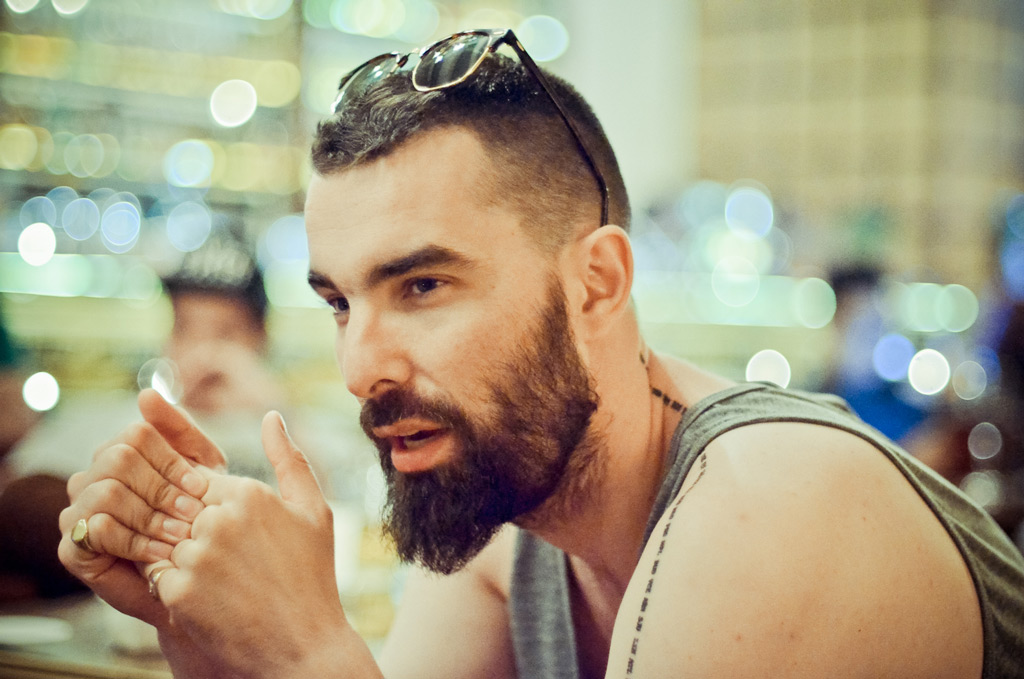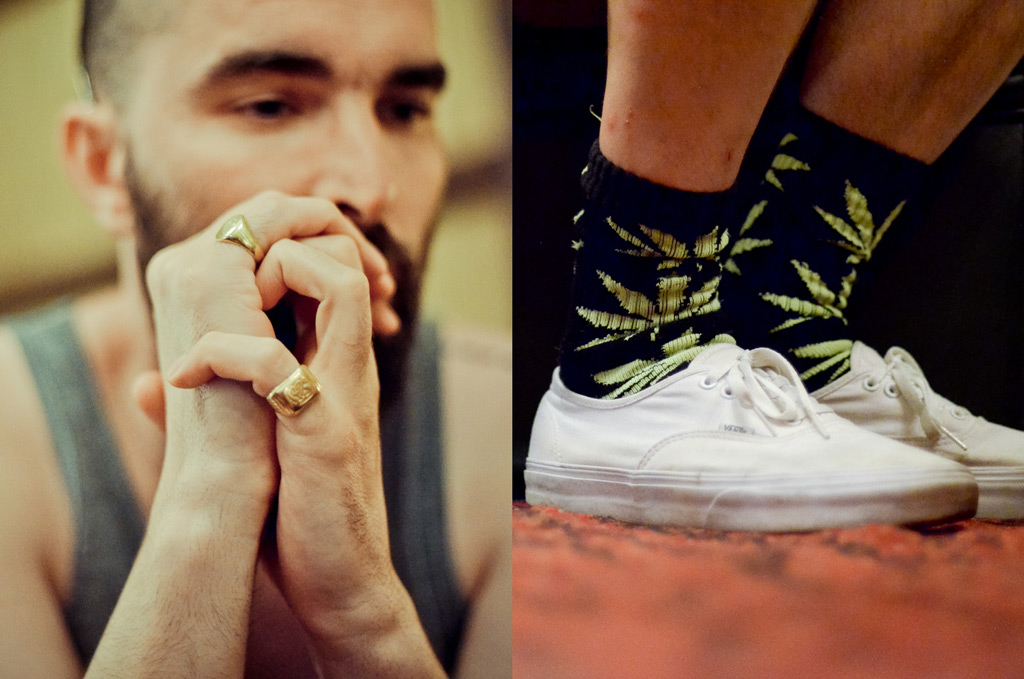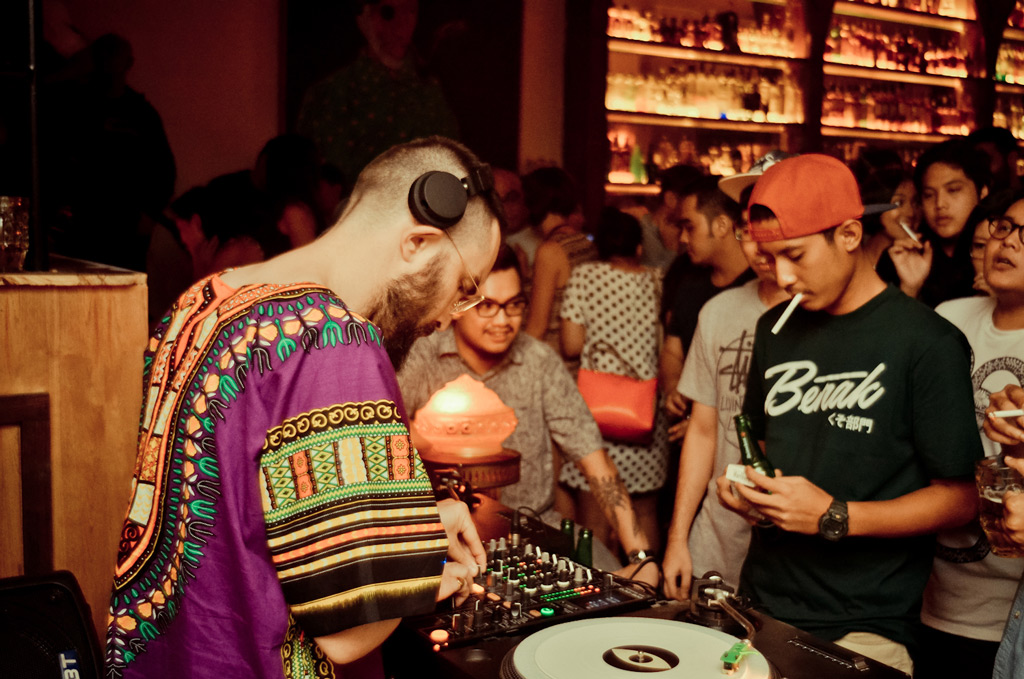Head Nodding with LeFtO
Chandra Drews (C) talks to famed Belgian disc jockey LeFtO (L).
by Ken Jenie








C
Let’s begin with a basic question. How did you get into music? Was it Jazz, Hip Hop, or perhaps another?
L
At home, my father used to listen to a lot of music. He had a great jazz collection – very classic jazz such as Frank Sinatra and Stan Getz, nothing crazy or spiritual [jazz]. That’s how I got introduced to that kind of music. TV introduced me to hip hop. There was a local band that was on a random Belgian TV show. Most of our generation were introduced to hiphop and turntablism during that time, thanks to those boys.
C
When was that? Early 90s?
L
It was around the late 80s, I was about 12 or so.
C
And when did you start Dj-ing?
L
Around 95’ or 96’. I was also introduced to music in school. Many of my friends were into grafitti, hip hop music, dance and all that stuff. Brussels is a famous city for music, a lot of the youth are into music – they make music, they relate to music.
C
And the whole hip hop culture is where you got your name, right?
L
My name [LeFtO] comes from grafitti. Everyone had their own names, my friends, for example, were Acro, Rush and Cure.
C
And how did LeFtO come about?
L
LeFtO [leve-tot] means “early-riser” in French. Me and my friends would have grafitti sessions until 6AM, and I would already wake up at 9AM. My friends looked at me and said “ah, you’re such an early-riser” and that is how my name came about.
LeFtO has nothing to do with Leftovers or being left handed – although I am left handed.
C
You started DJ-ing by playing hip hop?
L
Yes, I started with hip hop. I scratched a lot too.
C
When did you start producing?
L
A couple of years later. I started DJ-ing in 95/96’ so I think I started around the year 2000 – making beats on an S950 Akai and Atari.
C
Not long after that, you did the Blue Note project, right? How did that project come about?
L
It was 4 years later. I worked in a record shop called MusicMania for 10 years, and some people would come in and know me from what I was doing [DJ-ing]. One day, someone from Blue Note stopped by and asked me if I would be down to do a compilation for the label. I thought it was too easy and asked if I could do some remixes, and that’s what I did.
The funny thing is, I sent them a demo of what I thought would be good and they used it on the record (laughs).
C
You were always a Blue Note fan, I take it?
L
I was a jazz fan, it doesn’t have to be Blue Note. Everything from Impulse to CTI.
C
Is there a type of Jazz that you prefer?
L
I like spiritual jazz a lot, gospel jazz, and 70s Japanese jazz. Spiritual Jazz is my favorite, I like Pharaoh Sanders, Alice Coltrane, Lonnie Smith.
C
Classics right there. How did you get involved with Gilles Peterson?
L
We played together a couple of times in Belgium, and at one point he said to me “dude, I need you in my festival. There’s no budget, but I really want you there.” I said “let’s do it!” I did my thing, and they asked me to become a resident in the festival.
C
Do you remember when that was?
L
2008.
C
And then you got signed to Brownswood [Gilles Petersons’ label]?
L
Yes. I have done a lot of mixes for Brownswood, World Wide Awards. Me and Gilles Petersons share a lot of music – on a weekly basis.
C
I can’t pin point what your over all style is, could you describe to us what it is?
L
I call it the all over the place style, chaos, lost in music.
C
You basically play anything you like.
L
Yeah. I basically play music that I like and try to make sure the music fits with eachother. I don’t want it to be too brutal for people, there should be some subtleties. Perhaps a very slow soul song mixed with hip hop or bass music – I still want to make it subtle, that’s my touch. I want to be able to go from cumbia to hip hop without the listeners noticing it.
C
When did you start your radio show on Studio Brussel?
L
15 years ago.
C
15?
L
Yes, I started in 1999. It’s every week. It started as two hours, then one, then three, and for the past 5 years it has been back to two.
C
You upload them regularly to Mixcloud.
L
Yeah, people think that’s my radio show. A lot of people don’t know what I upload there actually gets broadcasted live on FM radio in Belgium every sunday. If weekly there are about five to ten thousand people listening on Mixcloud, there are much more people listening live in Belgium, and online from America, Holland, and other places.
C
Is Studio Brussel like the BBC Radio in Belgium?
L
Studio Brussel is one of the main, biggest, and most famous radio station in the country. It’s like the BBC because it is part of a broadcast company. It’s the 2nd or 3rd largest in the country with seven to nine hundred thousand listeners a day.
C
There seems to be a rich music scene in Belgium, or is it limited to Brussels and Antwerp?
L
It’s all over. Every little village has its own festival and concert hall. You might see the weirdest thing – Dimlight, Free The Robots – you will find the craziest obscure act in the most obscure little village. You will be like “Did I just saw Actress playing in a village for 20 people” – that is totally possible because the government supports culture, from the smallest village to the biggest city.
C
Is it still going on? Because, for example, in Holland there have been slashing the budgets for the arts.
L
It is still going on. Politicians in Belgium say that culture is essential. Of course the budget has been cut a little, but I can still tell you that there still a lot of festivals happening in most villages. I was just asked this week to play a small venue in a small village called Opwijk in Belgium with Free The Robots and others. I would play a mainstage and think the audience wouldn’t be ready for the music I select, and when you play you realize the kids were into everything that I played.
I think the radio does a lot, it’s my way to express and show people what music is all about and the underground, showing people that there are more than what you hear during the day. Even my station, during the day… there are sometimes surprises, but usually people don’t like what is being played during the day. The music begins to be interesting after 6-8 PM.
C
You’ve been to Asia many times, Japan most of the time. Is this your first time in South East Asia?
L
I’ve performed in Singapore two or three times before with Gilles.
C
This time, where did you perform besides Indonesia?
L
I played Manila for the second time, Seoul for the fourth time. It is my first time in Indonesia.
C
And what’s your take on the South East Asian scene? Any highlights so far?
L
From what I’ve seen, it seems like they want to head to a more European format with EDM [Electronic Dance Music] and such music, but there are little underground scenes where anything is possible.
Asia’s background isn’t the same as Europe or America, so maybe it will take a little bit more time to understand. But with EDM, if everybody gets into it, I believe it will be good for the long term because most of the EDM they listen to came from the underground, they just never knew. Some people from the mainstream took the underground music and gave it a commercial flip, but if you give the listeners something more underground – heavy beats and stuff – I think people will like it just as much as the mainstream EDM.
C
Did you buy any records in this region?
L
I bought a lot of records, yeah. Well not in Indonesia or South East Asia yet, I bought a lot of records in Japan and Korea. In fact I generally buy most of my records in Japan. A lot of spiritual jazz, mostly rare and very expensive stuff (laughs).
C
So, any plans on returning back to South East Asia in the near future?
L
Well no concrete plans as yet. No wait actually I do have a plan to present the Belgian music scene to Singapore. Because I have been in touch with the embassy of the Kingdom of Belgium in Singapore who did some promotion for my gig there, so I ended up meeting them all where I suggested that they set aside a little budget to present the Belgian beat scene to our community in Singapore, which is about 1200 people. But also to team up with the Darker Than Wax guys, kind of like a ‘beat exchange’. So yeah that’s more or less my plans for the future in the region.
C
Surely that would also work with other Belgian embassies throughout the region?
L
Well yeah but I haven’t had any contact with the Belgian embassy in Indonesia, so I don’t really know yet. But as I’m already in touch with the Singapore branch, I’m sure they can give me contacts for the other Belgian embassies throughout the region. So an ideal scenario would be that I do an embassy sponsored tour in Japan, Korea, Singapore and Jakarta. Who knows eh? That would be nice though.
C
I take it you’ve had good responses in this current Asian tour?
L
Yeah, though Japan has been pretty slow over the last year as they have this new law about the prohibition of dancing in clubs [Fuzoku Eigyo-to no Kisei Oyobi Gyomu no Tekiseika-to ni Kansuru Horitsu (Entertainment Business Control and Improvement Law)]”. But that’s going to change, I’m pretty sure of that as the lawmakers have been under a lot of pressure for that. So yeah Japan was predictably slow but Seoul was banging and so was Singapore. Manila was okay. As for Jakarta, well, we’ll see tonight (laughs).
C
Well, we’re basically approaching the end of the interview. But I just have to talk to you a little about football as I know you’re quite the fan. What do you think about Belgium’s chances in the World Cup?
L
I’m always honest (laughs). But yeah I’m really hoping Belgium can win a couple of games and get past the first round. I hope they finish first in the group. But honestly, every team is good otherwise they won’t be at the World Cup. But yeah we have a very young team so I’m quite hopeful man. Having said that, there’s a lot of hype about the team so I’m hoping the players don’t read the press as it might fuck up their heads (laughs).
C
But irrespective of the World Cup, this is a pretty exciting time to be a Belgian football fan eh? You country are producing lots of promising players.
L
Yeah! Well even the generation before this one was quite promising. And my local team in Belgium, Anderlecht, won the U17 and U21 Champions League last year and came as finalists this year. So there’s a very good generation of players coming through. In short the Belgian Football Association have put a lot of effort, time and resources into restructuring the youth system and we seem to be reaping the benefits right now.
C
You’re an Arsenal fan too aren’t you? Is that because of Gilles (Peterson)?
L
Yeah I like Arsenal but not because of Gilles (laughs), I’ve always followed them. And by principle I support any team that has at least one Belgian player, so it doesn’t really matter which team. It’s pretty important that we have our players playing in as many world-class teams everywhere in the world.
C
So is it true that the old Flemish-Walloon division within the Belgium team is gone?
L
I was actually tweeting about it this morning about someone saying how funny it is how one half of the country is actually voting for separatism but when it’s about football everyone seems to come together and supports the team. So yeah it’s a pretty funny and pathetic thing. But yeah it’s a good thing for Belgium when we have a strong national team.
C
So final question, who do you think will win the World Cup?
L
I think a European team this time around even though historically they have never won in South America. You know, I actually see Germany winning it and I really don’t see Brazil claiming the title. Everyone keeps going on about them but I really think they’ll underachieve. But yeah I hope Brazil won’t win it because I’m with the people (of Brazil) and as they’re not happy about the World Cup arrangements, I’m with them.
C
Great! That was my final question. Thanks again for your time LeFtO!
L
You’re welcome man.











